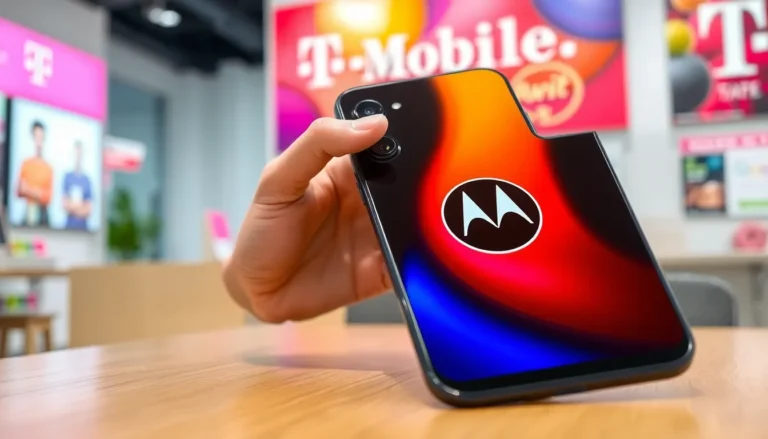In a world where there’s an app for everything, standing out can feel like trying to find a needle in a haystack—if the haystack was also on fire. With millions of apps vying for attention, effective promotion strategies are essential. Developers and marketers need to think beyond basic ads and dive into the creative pool of possibilities.
Table of Contents
ToggleUnderstanding Mobile App Promotion Strategies
Promoting a mobile app effectively requires a multi-faceted approach. Developers and marketers must engage in various strategies to stand out in a crowded marketplace. User acquisition stands as a primary goal; thus, focusing on targeted ads can yield high returns. Apps that leverage social media platforms often experience increased visibility.
Content marketing plays a significant role in app promotion. Creating valuable content related to the app fosters user interest. Influencer partnerships amplify reach as influencers share apps with their followers. Offering incentives like discounts or freebies encourages users to download and engage.
App Store Optimization (ASO) strengthens app visibility in stores. Developers should incorporate relevant keywords in app titles and descriptions. Positive user reviews can boost an app’s ranking; encouraging satisfied users to leave feedback helps. Visual elements, such as compelling screenshots and engaging videos, attract potential users.
Email marketing remains effective for retaining users. Sending informative newsletters keeps users updated on new features or promotions. Additionally, push notifications serve to re-engage users, prompting them to return to the app.
Measurement and analytics crucially inform promotion tactics. Tracking user behavior helps identify trends and optimize strategies. Regularly reviewing performance metrics enables developers and marketers to adjust their approach based on real-time data.
Diversifying marketing channels enhances app promotion effectiveness. Exploring partnerships with other apps and platforms facilitates cross-promotion opportunities. Each strategy contributes to a comprehensive promotional plan that effectively drives downloads and engagement.
Importance of Mobile App Promotion
Mobile app promotion plays a crucial role in achieving success in a competitive market. Developers require effective strategies to ensure their apps are discovered and downloaded by users.
Enhancing Visibility
Visibility is paramount when it comes to app promotion. Utilizing App Store Optimization (ASO) improves rankings through strategic keyword integration. Engaging visuals like screenshots and demo videos contribute to a more appealing presentation, capturing the attention of potential users. Social media serves as a valuable platform for increasing visibility, allowing developers to connect with target audiences. Positive user reviews significantly enhance credibility and influence download decisions. Regular updates and promotions encourage ongoing visibility and keep the app relevant in users’ minds.
Increasing Downloads
Increasing downloads directly impacts an app’s success. Targeted advertising campaigns can drive significant user acquisition, especially when creatively designed to resonate with audiences. Offering incentives such as exclusive discounts or in-app rewards boosts engagement and motivates downloads. Partnerships with influencers yield expansive reach, further amplifying promotional efforts. Launching promotions or seasonal events creates urgency among users, prompting them to download faster. Engaging content marketing attracts and informs potential users about the app’s unique features, ultimately leading to higher download rates.
Key Mobile App Promotion Strategies
Mobile app promotion requires strategic techniques to enhance visibility and attract users. Effective methods include App Store Optimization, social media marketing, influencer collaborations, content marketing, and paid advertising.
App Store Optimization (ASO)
ASO focuses on improving an app’s visibility in app stores. Developers benefit from using relevant keywords in app descriptions and titles. Positive user reviews significantly enhance an app’s ranking as well. Engaging visuals, including screenshots and demo videos, capture user interest effectively. Ensuring regular updates keeps the app relevant, increasing the likelihood of downloads.
Social Media Marketing
Social media marketing leverages platforms like Facebook, Instagram, and Twitter. Developers should create targeted ads that resonate with their audience’s interests. Engaging content shared across social channels fosters user interaction. Consistent interaction with audiences builds community loyalty and encourages word-of-mouth promotion. Utilizing analytics helps optimize campaigns for better performance.
Influencer Collaborations
Influencer collaborations involve partnering with individuals who have large followings. Selecting influencers whose values align with the app’s brand increases credibility. These partnerships provide access to new audiences, enhancing brand exposure. Authentic reviews from influencers can drive user interest and downloads effectively. Engaging influencers for contests or giveaways creates excitement and encourages user participation.
Content Marketing
Content marketing creates valuable content related to the app’s niche. By producing blog posts, videos, and infographics, developers can educate potential users. Shareable content generates organic interest and drives traffic to the app’s landing page. Establishing an email newsletter keeps users informed and engaged over time. Providing educational resources positions the app as a trusted source in its category.
Paid Advertising
Paid advertising involves using platforms like Google Ads or Facebook Ads to reach targeted audiences. Developers should budget effectively for campaigns to maximize returns. Tailoring ads for specific demographics increases relevance and engagement. Performance metrics must be monitored closely to identify successful strategies. Experimenting with different ad formats keeps campaigns fresh and appealing.
Measuring the Success of Strategies
Measuring the success of mobile app promotion strategies entails evaluating various metrics and using the right tools. Ensuring effectiveness requires accurate tracking of user engagement and acquisition rates.
Analytics Tools
Utilizing analytics tools is fundamental for understanding user behavior. Popular options like Google Analytics and Firebase provide in-depth insights into app performance. These tools track user interactions, retention rates, and conversion metrics. Dashboards display real-time data, allowing marketers to adjust strategies promptly. Implementing these tools helps identify trends that contribute to user engagement and growth.
Key Performance Indicators (KPIs)
Establishing key performance indicators (KPIs) facilitates focused measurement of success. Metrics such as daily active users, average session length, and customer acquisition cost are essential. Tracking user retention rates indicates how well users engage over time. In addition, monitoring conversion rates aids in determining the effectiveness of promotional campaigns. Each KPI provides actionable insights, enabling marketers to refine their strategies for maximum impact.
Effective mobile app promotion requires a blend of innovative strategies tailored to the competitive landscape. By focusing on user acquisition through targeted advertising and leveraging social media, developers can enhance visibility and engagement. Content marketing and influencer partnerships further enrich promotional efforts, creating authentic connections with potential users.
App Store Optimization remains a cornerstone of success, ensuring that apps stand out in crowded marketplaces. Regular updates and engaging visuals keep users interested and informed. Ultimately, a data-driven approach to measuring performance can refine these strategies, leading to increased downloads and sustained user loyalty. Embracing diverse marketing channels and staying adaptable is key to thriving in the mobile app ecosystem.




